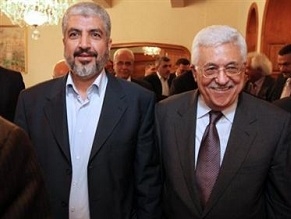|
World Jewish News

Palestinian President Mahmud Abbas and exiled Hamas chief Khaled Meshaal have agreed to expedite a reconciliation deal between the rival factions
|
Abbas on Cairo reconciliation talks with Hamas: group agreed to two-state solution on 1967 borders
11.01.2013, Israel and the World Hamas agreed with the Fatah party on the terms for a future two state solution, as well as abandoning aggressive resistance tactics, said Palestinian Authority (PA) President Mahmoud Abbas following Egypt-brokered reconciliation talks in Cairo Wednesday.
According to official Palestinian news agency Wafa, Abbas told journalists the rival factions had reached consensus on a future “Palestine on the 1967 borders living side by side with the state of Israel”.
However, even as talks continued into Wednesday, Israeli Premier Benjamin Netanyahu refused their proposed geographical borders, as he warned that should intra-Palestinian reconciliation take place as called for by much of the international community including the EU, following the PA’s successful bid for non-member observer status at the UN last November, “any territory we evacuate will be taken over by Hamas and Iran”.
In a meeting with the outgoing settler community leader of East Jerusalem and the Gaza Strip Danny Dayan, he spoke of “internal unity” as the only sure defence tactic for Israel, concluding: “We are a small nation that needs to defend its future. We will do it together.” Dayan announced his resignation from the settler movement Tuesday to join Netanyahu’s campaign team ahead of Israel’s January 22 elections, as he said to fear that the recent surge in support for the far-right Habayit Hayedi party could threaten the traditional alliance between the settlers and Netanyahu’s more centre-right Likud party, which has announced a series of internationally-condemned settlement expansion plans in the aftermath of the UNGA vote.
Also following Wednesday’s meeting in the Egyptian capital, Abbas confirmed he had appealed to the UN to demand that Israel open its borders to Palestinian refugees living in civil war-torn Syria to enter the West Bank and Gaza Strip. Israel had already offered to do so, on condition that the refugees legally forewent their right to return to Israel’s 1967 borders, a fact that UN Secretary-General Ban Ki-Moon reiterated in response to Abbas’ request for intervention. Abbas however rejected Israel’s conditions.
The international community, despite petitioning for an intra-Palestinian reconciliation, has been equivocal in calling on Abbas to avoid resorting to further unilateral action as well as seeking membership of other international bodies following his success at the UNGA. Abstaining EU member state Britain, alongside historic Israel ally Italy, who broke with convention to vote in favour of the PA’s motion for statehood, have both led calls for restraining action on the part of the Palestinians.
Stressing Italy’s abiding “strong and traditional friendship towards Israel” in the aftermath of its shock vote, which has seen the European nation head off criticism by the EU foreign affairs council in recent times, the Italian foreign office confirmed Premier Mario Monti had given his Israel counterpart “Italy’s firm commitment to avoid any manipulation that could unduly lead Israel, which has a right to ensure its own security, before the International Criminal Court”.
British Foreign Minister William Hague meanwhile asserted his delegation’s abstention “was guided by the principle of how to create the right environment for a swift to return to peace talks and the strongest possible foundation for the peace process”.
“The window for a two-state solution is closing, and we need urgent efforts by the parties and by the international community to achieve a return to negotiations, not actions which will make that harder,” he concluded.
EJP
|
|
